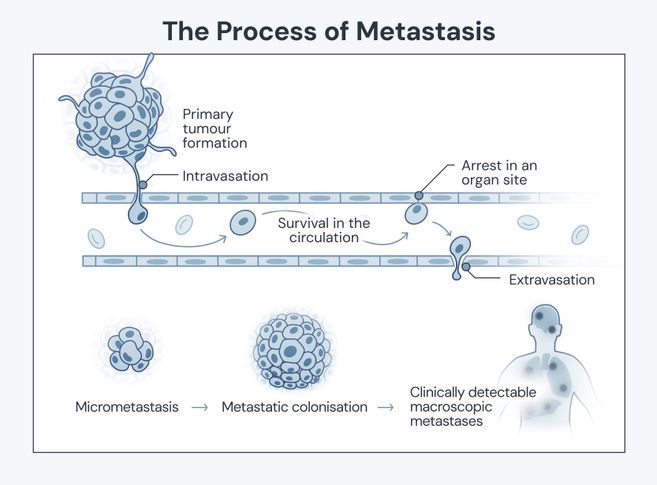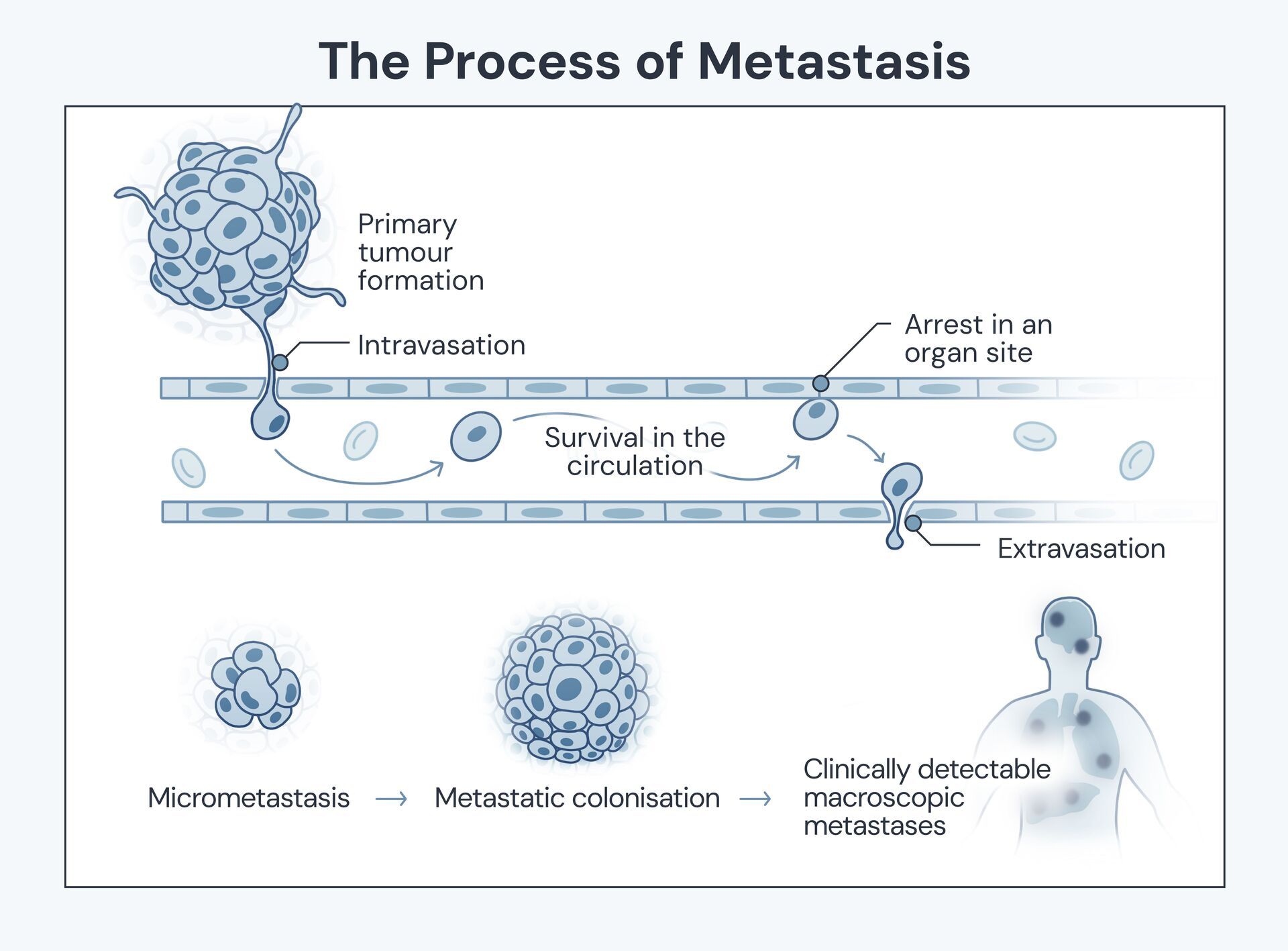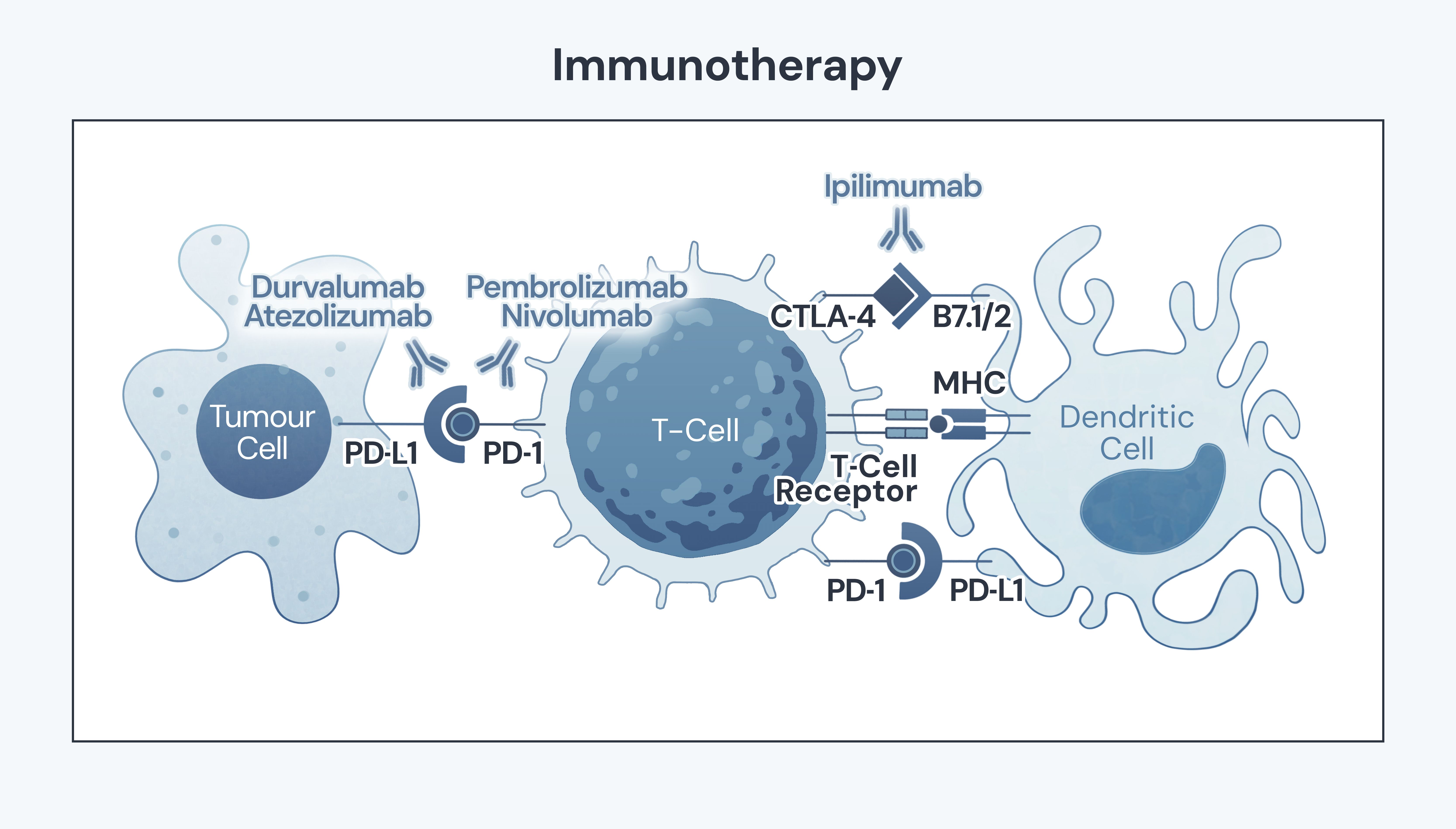Metastatic Disease: Advanced Treatment and Care
When cancer spreads to other parts of the body, it is called metastatic disease. In this article Dr James Wilson answers questions such as 'What is Metastatic Disease?' and 'How does cancer spread?'. With expertise in radiotherapy, targeted therapies, and immunotherapy, he helps patients with Stage 4 cancer access the latest options quickly and with confidence.


Jump to:
- What is Metastatic Disease?
- Definition and Overview of Metastatic Cancer
- How Cancer Spreads
- Common Sites of Metastasis
- Symptoms of Metastatic Disease
- General Symptoms
- Symptoms by Metastasis Location
- Diagnosis of Metastatic Disease
- Imaging Tests
- Biopsy and Other Tests
- Treatment Options for Metastatic Disease
- Overview of Treatment Approaches
- Systemic Therapies
- Chemotherapy
- Immunotherapy
- Targeted Therapy
- Local Therapies
- Radiation Therapy for Stage 4 cancer
- Surgery
- Advanced Treatment Options at Dr. James Wilson's Practice
- Stereotactic Radiotherapy (SABR) for oligometastatic disease
- Immunotherapy and Targeted Drug Therapies for Stage 4 cancer
- Combination Approaches to get the best results for people with Stage 4 cancer
- Why Choose Dr. James Wilson for Metastatic Cancer Treatment?
- Expertise and Experience
- Personalised Care Plans
- Access to Advanced Technologies
- Living with Metastatic Disease
- Managing Symptoms
- Support and Resources
- Contact Us
When cancer spreads beyond its original site, we call it 'metastatic disease' - sometimes referred to as 'Stage 4 cancer'. While this diagnosis can feel overwhelming, advanced treatment options now offer new hope for managing metastatic cancer and maintaining quality of life. Dr James Wilson specialises in providing personalised, cutting-edge treatments for metastatic disease, helping patients access the latest therapies and achieve the best possible outcomes.
Understanding that each patient's journey with metastatic cancer is unique, Dr Wilson combines his expertise in advanced radiation therapy, targeted therapies, and immunotherapy to create treatment plans tailored to your specific cancer type and individual needs. His approach focuses not just on treating the disease, but on preserving and improving your quality of life throughout your treatment journey.
There are lots of resources about metastatic disease throughout the website. Most of them can be found from this page here.
What is Metastatic Disease?
Definition and Overview of Metastatic Cancer
Metastatic disease occurs when cancer cells spread from the primary tumour (the primary site - the lung in lung cancer, the colon in colon cancer, for example) to other areas of the body through the bloodstream or lymphatic system (distant metastasis). These cancer cells maintain the characteristics of the original tumor, which is why treatment focuses on the primary cancer type rather than the location where the metastasis occurs.
The process of metastasis involves cancer cells breaking away from the primary tumor, travelling through blood vessels or lymph nodes, and establishing new tumors in distant organs. While this represents advanced cancer, modern treatment approaches offer significant opportunities to control the disease and maintain quality of life for extended periods.
Dr Wilson's expertise in treating various cancer types including lung metastases, liver metastases, bone metastases, and brain metastases ensures that patients receive specialist care regardless of where their metastatic disease has developed. His understanding of how different cancer types behave when they spread allows for more targeted and effective treatment approaches.
How Cancer Spreads

Cancer spreads through a complex process that begins when cancer cells develop the ability to invade nearby tissues and enter the bloodstream or lymphatic system. Once in circulation, these cells can travel to distant organs where they may establish new tumours if conditions are favourable for growth.
The immune system typically recognises and destroys most cancer cells that enter the bloodstream. However, some cancer cells can evade immune detection and survive the journey to distant sites. These surviving cells must then adapt to their new environment and stimulate the growth of new blood vessels to support tumor growth.
Understanding this process helps Dr Wilson develop treatment strategies that not only target existing metastases but also work to prevent further spread. His approach incorporates systemic therapy to address circulating cancer cells alongside local treatments for established metastatic tumors.
Common Sites of Metastasis
Different cancer types show preferences for specific metastatic sites, a phenomenon that influences treatment planning and monitoring strategies. Bone metastases are common in breast, prostate, and lung cancers, while liver metastases frequently occur with colorectal cancer, pancreatic cancer, and stomach cancer.
Brain metastasis most commonly develops from lung cancer, breast cancer, and kidney cancer, requiring specialised treatment approaches due to the unique challenges of treating cancer in the central nervous system. Understanding these patterns helps Dr Wilson anticipate potential sites of spread and implement appropriate monitoring and treatment strategies.
The adrenal glands, spinal cord, and nearby tissues may also be affected by metastatic disease, depending on the primary cancer type. Dr Wilson's comprehensive approach addresses not only existing metastases but also works to prevent spread to these critical areas through targeted systemic therapy.
Symptoms of Metastatic Disease
General Symptoms
Metastatic disease can cause a range of symptoms that may vary depending on the location and extent of spread. Common general symptoms include unexplained weight loss, persistent fatigue, and changes in appetite that can significantly impact quality of life and daily functioning.
Many patients experience bone pain when metastases develop in the skeletal system, while others may notice swelling or discomfort in specific areas where metastatic tumours have formed. These symptoms of metastatic cancer often develop gradually, though some patients may experience more rapid onset of symptoms.
We emphasise the importance of early symptom recognition and prompt evaluation, as timely intervention can often provide significant relief and improve treatment outcomes. His approach includes comprehensive symptom management alongside cancer treatment to maintain the best possible quality of life.
Symptoms by Metastasis Location
The location of metastatic disease determines many of the specific symptoms patients experience. Liver metastasis may cause abdominal swelling, nausea, or jaundice, while lung metastases may result in shortness of breath, persistent cough, or chest discomfort that requires immediate attention.
Brain metastases can cause headaches, seizures, or neurological changes that significantly impact daily life and require urgent specialist intervention. Bone metastases can cause bone pain, increased fracture risk, and mobility issues that can be effectively managed with appropriate treatment approaches.
When cancer has spread to the spine, it can press on the spinal cord causing symptoms like back pain, leg weakness and loss of control of your bowel or bladder. We hope to detect, and treat, cancer in the spine long before these symptoms develop. We call cancer spots pressing on the spinal cord 'metastatic cord compression'.
Dr Wilson's experience treating metastases in various locations ensures that patients receive targeted symptom management alongside their cancer treatment. His multidisciplinary approach coordinates care across different specialties to address the complex needs of patients with widespread metastatic disease.
Diagnosis of Metastatic Disease
Imaging Tests
Accurate diagnosis of metastatic disease requires sophisticated imaging techniques that can detect cancer spread throughout the body. CT scans provide detailed images of internal organs and can identify metastatic tumours in the liver, lungs, and other soft tissues with high precision.
Positron emission tomography (PET) scans, often combined with CT imaging, can detect metabolically active cancer cells and help distinguish between scar tissue and active metastatic disease. This advanced imaging technique is particularly valuable for staging metastatic disease and monitoring treatment response.
Bone scans specifically evaluate the skeletal system for bone metastases, which are common in many cancer types including breast, prostate, and lung cancers. Dr Wilson access the most advanced imaging technologies available to ensure accurate staging and treatment planning for your specific situation.
Biopsy and Other Tests
When imaging suggests metastatic disease, tissue sampling through biopsy procedures may be necessary to confirm the diagnosis and determine the specific cancer type. This information is crucial for selecting the most appropriate treatment approach and accessing targeted therapies.
Blood tests can provide valuable information about overall health status and may include tumor markers that help monitor disease progression and treatment response. These tests also assess organ function and help determine a patient's fitness for various treatment options.
Dr Wilson coordinates comprehensive diagnostic workups that provide all necessary information for treatment planning while minimising patient discomfort and delays. His approach ensures that patients receive accurate diagnoses quickly, allowing treatment to begin without unnecessary delays that could impact outcomes.
Treatment Options for Metastatic Disease
Overview of Treatment Approaches
Modern treatment of metastatic disease involves a multimodal approach that combines systemic therapies to address cancer throughout the body with local treatments for specific metastatic sites. The goal is to control disease progression, manage symptoms, and maintain quality of life for as long as possible.
Dr Wilson's treatment philosophy focuses on personalised care that considers not only the medical aspects of metastatic disease but also the patient's personality, individual preferences, lifestyle, and treatment goals. This approach ensures that treatment plans align with each patient's unique circumstances and priorities.
The selection of treatment options depends on multiple factors including the primary cancer type, the area of the body that the cancer spot is in, the extent of metastatic disease, previous treatments received, and the patient's overall health status. Dr Wilson's expertise across multiple cancer types ensures optimal treatment selection for each individual situation.
Systemic Therapies
Chemotherapy
Chemotherapy remains an important treatment option for many types of metastatic disease, particularly small cell lung cancer and certain other cancer types that respond well to these medications. Modern chemotherapy regimens are more targeted and better tolerated than older approaches.
The selection of chemotherapy drugs depends on the specific cancer type, genetic characteristics of the tumor, and previous treatments received. Dr Wilson carefully evaluates each patient's situation to determine the most appropriate chemotherapy approach while minimising side effects.
Combination chemotherapy regimens may be used to improve effectiveness against cancer cells while maintaining acceptable side effects. Dr Wilson's experience with various chemotherapy protocols ensures that patients receive optimal treatment while preserving quality of life throughout their treatment journey.
Immunotherapy
Immunotherapy has revolutionised the treatment of metastatic disease by harnessing the body's immune system to fight cancer cells. These treatments have shown remarkable success in treating metastatic prostate cancer, triple-negative breast cancer, lung cancer and many other cancer types.
The effectiveness of immunotherapy depends on specific characteristics of the cancer cells and the patient's immune system. Dr Wilson utilises advanced testing to identify patients who are most likely to benefit from these innovative treatments.
Immunotherapy drugs stop the cancer cells from being able to hide from your immune system. The cancer cell 'switches off' the white blood cells that recognise the cancer cells as abnormal. This stops the immune system from destroying the cancer cell.
The different immunotherapy drugs target different ways in which the cancer cell switches off the immune response.

Immunotherapy treatments often have different side effects compared to traditional cancer treatments, requiring specialist expertise in their management. Dr Wilson's experience with these treatments ensures optimal outcomes and appropriate management of any immune-related side effects.
Targeted Therapy
Targeted therapy medications are designed to attack specific molecular features of cancer cells, offering more precise treatment with potentially fewer side effects than traditional chemotherapy. These treatments are particularly effective for certain genetic subtypes of various cancer types.
Comprehensive genetic testing of metastatic tumours helps identify patients who may benefit from targeted therapies directed against specific growth factors or cellular pathways. This personalised approach to treatment selection has significantly improved outcomes for many patients with metastatic disease - e.g. osimertinib (Tagrisso) in the treatment of EGFR-driven non-small cell lung cancer.
Dr Wilson stays current with the latest developments in targeted therapy and has access to the newest treatments available. His expertise ensures that patients receive the most appropriate targeted therapies for their specific cancer characteristics.
Local Therapies
Radiation Therapy for Stage 4 cancer
The role of stereotactic radiotherapy in Stage 4 lung cancer in an attempt to eradicate the sites of disease that have appeared or growing is discussed here.
Modern radiation therapy techniques allow for precise treatment of metastatic disease while protecting healthy surrounding tissue. These approaches can provide excellent local control of metastatic tumours and significant symptom relief for patients with bone pain or other local symptoms.
Advanced radiation therapy techniques including intensity-modulated radiation therapy and image-guided approaches ensure accurate targeting of metastatic disease. Dr Wilson's expertise in these advanced techniques provides patients with access to the most precise and effective radiation treatments available.
Radiation therapy can be used to treat single or multiple metastatic sites, depending on the clinical situation. The treatment approach is tailored to each patient's specific needs and goals, whether focusing on symptom relief, local control, or prevention of complications.
The most common sites that I treat with SABR are when cancer has spread to the bone (bone metastasis), liver, brain, adrenal glands, distant or nearby lymph nodes, the spine or the lung. It has a high chance of eradicating the cancer deposit so that it never returns at that site.
Surgery
Surgical treatment of metastatic disease may be appropriate in selected cases, particularly when metastases are limited in number and location. This approach, sometimes called metastasectomy, can provide excellent long-term control for carefully selected patients.
The decision about surgical treatment depends on many factors including the location of metastases, the patient's overall health, and the likelihood of achieving complete removal of metastatic disease. Dr Wilson works closely with expert surgeons to evaluate surgical options for appropriate patients.
Surgery may also be used for symptom management, such as stabilising bone metastases that threaten fracture or removing metastases that cause significant symptoms. These palliative surgical approaches can significantly improve quality of life for patients with advanced cancer.
Advanced Treatment Options at Dr. James Wilson's Practice
Stereotactic Radiotherapy (SABR) for oligometastatic disease
Stereotactic radiotherapy represents one of the most advanced treatments available for metastatic disease, delivering highly precise radiation doses that can achieve excellent local control with minimal side effects. This technique is particularly effective for treating limited metastatic disease in various locations.
Dr Wilson's expertise in stereotactic radiotherapy for oligometastatic disease allows patients to access this cutting-edge treatment that may not be widely available elsewhere. The precision of this technique enables treatment of metastases near critical structures such as the spinal cord or major organs.
Clinical trials have demonstrated that stereotactic radiotherapy can significantly improve outcomes for patients with limited metastatic disease, potentially extending survival while maintaining quality of life. Dr Wilson's experience with this technique ensures optimal treatment planning and delivery for appropriate patients.
SABR, when used at the right time, can be a highly effective treatment for people with Stage IV cancer of any type. The most common types of cancer I see are lung cancer, colon cancer, prostate cancer, or breast cancer - but these principles can be applied to any type of cancer (e.g. melanoma skin cancer or bladder cancer). If it hasn't been mentioned to you, ask your medical oncologist if it may be of benefit to you.
Oligometastatic disease is a special situation in which the cancer has only spread to a small number of sites. SABR can be useful in eradicating the spots of cancer wherever it has spread.
Another situation where I offer SABR for Stage 4 cancer is when people are established on treatment (e.g. hormone therapy or targeted therapy) and the cancer is mostly controlled, but has started to grow in one or two spots. This is called treatment for oligoprogression, and it can mean that you can stay on the treatment you are on for longer - keeping other options for use further down the line.
Immunotherapy and Targeted Drug Therapies for Stage 4 cancer
Dr Wilson provides access to the latest immunotherapy and targeted drug therapies, many of which may not be immediately available through standard NHS pathways. These innovative treatments offer new hope for patients with metastatic disease of various types.
The selection of immunotherapy or targeted therapy depends on detailed analysis of the cancer's molecular characteristics and the patient's individual situation. Dr Wilson utilises advanced diagnostic techniques to identify the most appropriate treatments for each patient.
Access to clinical trials investigating new immunotherapy and targeted therapy approaches provides additional treatment options for patients who may benefit from experimental therapies. Dr Wilson's involvement in the oncology research community ensures awareness of the most promising new treatments.
Combination Approaches to get the best results for people with Stage 4 cancer
Many patients benefit from combination treatment approaches that integrate multiple therapeutic modalities to achieve optimal outcomes. Dr Wilson's expertise allows him to coordinate complex treatment plans that may include radiation therapy, systemic therapy, and supportive care measures.
The sequencing and timing of different treatments can significantly impact their effectiveness and tolerability. Dr Wilson's experience in managing complex treatment protocols ensures that patients receive coordinated care that maximises benefits while minimising side effects.
Combination approaches may evolve over time as the cancer responds to treatment or develops resistance to specific therapies. Dr Wilson's ongoing monitoring and adjustment of treatment plans ensures that patients continue to receive optimal care throughout their journey with metastatic disease.
The sequencing of systemic therapies (e.g. immunotherapy) with local therapies (e.g. stereotactic radiotherapy or surgery) is essential in keeping you as well as possible with Stage 4 cancer, for as long as possible. The key is getting the sequencing of the treatment right and responding quickly if there are any sites of disease that are misbehaving!
Why Choose Dr. James Wilson for Metastatic Cancer Treatment?
Expertise and Experience
Dr Wilson brings extensive experience in treating metastatic disease across multiple cancer types, with particular expertise in advanced radiation therapy techniques and systemic treatments. His comprehensive approach addresses both the medical and personal aspects of living with metastatic cancer.
As Dr Wilson offers both stereotactic radiotherapy and current practice-leading drug treatments, he can sequence the treatments in the right way to get the best results for you and control the cancer for as long as possible. Ideally, you'll enjoy periods of time when you aren't on treatment and your cancer is controlled - something that can only be achieved by giving you rapid access to the best treatments for metastatic cancer.
His involvement in the latest research and clinical trials ensures that patients have access to cutting-edge treatments that may not be available elsewhere. This commitment to staying current with advances in metastatic cancer treatment directly benefits his patients through access to innovative therapies.
Dr Wilson's experience treating complex cases of metastatic disease means that patients receive care from someone who understands the challenges and opportunities presented by advanced cancer. His expertise spans multiple specialties, allowing for comprehensive care coordination.
Personalised Care Plans
Every patient with metastatic disease has unique circumstances, preferences, and goals that must be considered in treatment planning. Dr Wilson takes time to understand each patient's individual situation and develops treatment plans that align with their specific needs and priorities.
The complexity of metastatic disease requires careful coordination of multiple treatments and support services. Dr Wilson's personalised approach ensures that all aspects of care are integrated and focused on achieving the best possible outcomes for each individual patient.
Regular review and adjustment of treatment plans ensures that care remains optimal as circumstances change or new treatment options become available. Dr Wilson's commitment to personalised care means that patients receive treatment plans that evolve with their needs over time.
Access to Advanced Technologies
Dr Wilson's practice provides access to the most advanced treatment technologies available for metastatic disease, including state-of-the-art radiation therapy equipment and the latest systemic therapy options. This technological advantage can significantly impact treatment outcomes.
The availability of advanced imaging techniques for treatment planning and monitoring ensures that patients receive the most precise and effective treatments possible. Dr Wilson's access to cutting-edge technology supports optimal treatment delivery and monitoring.
Early access to new treatment technologies and techniques through research collaborations provides additional opportunities for patients who may benefit from innovative approaches. Dr Wilson's commitment to advancing cancer care directly benefits his patients through access to the latest innovations.
Living with Metastatic Disease
Managing Symptoms
Effective symptom management is crucial for maintaining quality of life while living with metastatic disease. Dr Wilson's comprehensive approach addresses not only the cancer itself but also the various symptoms that can impact daily life and overall wellbeing.
Pain management strategies may include medications, radiation therapy, or other interventions depending on the specific symptoms and their underlying causes. Dr Wilson works with patients to develop individualised symptom management plans that provide optimal relief while minimising side effects.
Fatigue, nausea, and other treatment-related side effects can often be managed effectively with appropriate interventions. Dr Wilson's experience in managing these complex situations ensures that patients receive comprehensive support throughout their treatment journey, involving colleagues such as occupational therapists, physiotherapists and exercise physiologists as needed.
Support and Resources
Living with metastatic disease affects not only patients but also their loved ones and families. Dr Wilson recognises the importance of providing support and resources that address the emotional and practical challenges associated with advanced cancer.
Access to specialist nurses, social workers, and other healthcare professionals ensures that patients receive comprehensive support beyond medical treatment. This multidisciplinary approach, including palliative care if appropriate, addresses the various needs that arise when living with metastatic disease.
Support groups and patient education resources can provide valuable information and emotional support for patients and families navigating the challenges of metastatic cancer. Dr Wilson's practice connects patients with appropriate resources to support their journey.
Contact Us
If you or a loved one has been diagnosed with metastatic disease, Dr Wilson's expertise in advanced treatment approaches can provide new options and hope for better outcomes. His personalised approach combines the latest treatments with compassionate care focused on maintaining quality of life.
The complexity of metastatic disease requires specialist expertise and access to advanced treatment options that may not be widely available. Dr Wilson's practice provides both the clinical expertise and cutting-edge treatments necessary for optimal management of metastatic cancer.
Don't let a diagnosis of metastatic disease limit your treatment options or hope for the future. Dr Wilson's advanced treatment approaches and personalised care plans offer new possibilities for patients with even complex metastatic cancer situations.
If you'd like to get in touch - click here.
Book a consultation with Dr. James Wilson to discuss your Stage 4 cancer treatment options and explore the advanced therapies that could help you achieve better outcomes and improved quality of life.